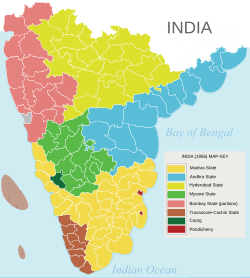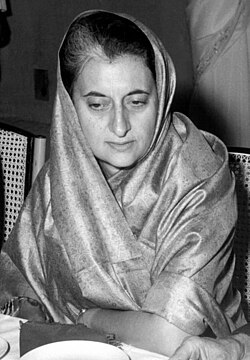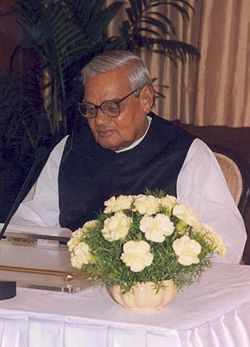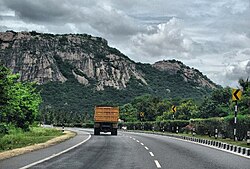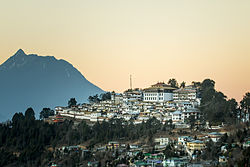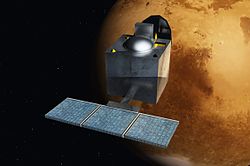- Indian Army officers of the 4th Sikh Regiment captured a Police Station in Lahore, Pakistan, after winning the Battle of Burki, during the Indo-Pakistani War of 1965.
- The Indian Air Force used 20 small and lightweight Canberra bombers against the Portuguese forces during Operation Vijay, which led to the Annexation of Goa.
- Disputed areas in the western sector of the Sino-Indian border including Aksai Chin, 1988 CIA map

The history of independent India or history of Republic of India began when the country became an independent sovereign state within the British Commonwealth on 15 August 1947. Direct administration by the British, which began in 1858, affected a political and economic unification of the subcontinent. When British rule came to an end in 1947, the subcontinent was partitioned along religious lines into two separate countries—India, with a majority of Hindus, and Pakistan, with a majority of Muslims. [1] Concurrently the Muslim-majority northwest and east of British India was separated into the Dominion of Pakistan, by the Partition of India. The partition led to a population transfer of more than 10 million people between India and Pakistan and the death of about one million people. Indian National Congress leader Jawaharlal Nehru became the first Prime Minister of India, but the leader most associated with the independence struggle, Mahatma Gandhi, accepted no office. The constitution adopted in 1950 made India a democratic republic with Westminster style parliamentary system of government, both at federal and state level respectively. The democracy has been sustained since then. India's sustained democratic freedoms are unique among the world's newly independent states, [2] despite its history being perforated by several crises and recent worries of democratic backsliding under the premiership of Narendra Modi. [3]
Contents
- 1947–1950: Dominion of India
- Partition of India
- Integration of princely states
- Constitution
- Indo-Pakistani War of 1947–1948
- Governance and politics
- Nehru administration (1952–1964)
- States reorganisation
- Development of a multi-party system
- Foreign policy and military conflicts
- 1960s after Nehru
- 1970s
- Merger of Sikkim
- Formation of Northeastern states
- Green revolution and Operation Flood
- Bangladesh Liberation War
- Indian Emergency
- Janata interlude
- 1980s
- Rajiv Gandhi administration
- Janata Dal
- 1990s
- Economic reforms
- Era of coalitions
- 2000s
- Under Bharatiya Janata Party
- Congress rule returns
- 2010s
- Congress rule continues
- 2014 – Return of Bharatiya Janata Party (BJP) Government
- 2020s
- COVID-19 pandemic
- Post COVID-19 India
- Economy
- Pre-liberalisation period (1947–1991)
- Post-liberalisation period (since 1991)
- See also
- Notes
- References
- Works cited
- Further reading
- Primary sources
- External links

The country has faced religious violence, casteism, corruption, malnutrition, poverty, unemployment, language conflicts, naxalism, terrorism, separatist insurgencies in Jammu and Kashmir, North East India and gender-based violence. India has unresolved territorial disputes over Kashmir and Arunachal Pradesh with China which escalated into a war in 1962 and 1967, Kashmir with Pakistan which resulted in wars in 1947–1948, 1965, 1971 and 1999 and Kalapani with Nepal. India was neutral in the Cold War, and was a leader in the Non-Aligned Movement. However, it made a loose alliance with the Soviet Union from 1971, when Pakistan was allied with the United States and the People's Republic of China.

| History of India |
|---|
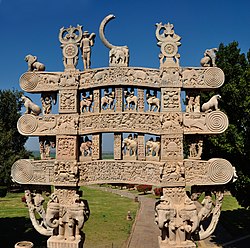 |
| Timeline |
| History of South Asia |
|---|
 |
India is a nuclear-weapon state, having conducted its first nuclear test in 1974, followed by another five tests in 1998. From the 1950s to the 1980s, India followed socialist-inspired policies. The economy was influenced by extensive regulation, protectionism and public ownership, leading to pervasive corruption and slow economic growth. Since 1991, India has pursued more economic liberalisation. Today, India is the third largest and one of the fastest-growing economies in the world.
From being a relatively struggling country in its formative years, [4] the Republic of India has emerged as a fast growing G20 major economy. [5] [6] India has sometimes been referred to as a great power and a potential superpower given its large and growing economy, military and population. [7] [8] [9] [10]






